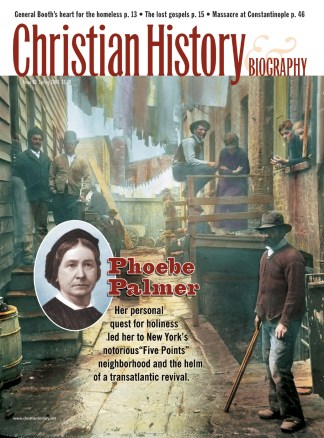When did the plight of the homeless first pierce your heart? Bramwell Booth, son of the beloved Salvation Army founder William Booth, remembers this moment in his father’s life—and how the senior Booth responded:
One morning, away back in the eighties, I was an early caller at his house in Clapton. Here I found him in his dressing-room, completing his toilet with ferocious energy. The hair-brushes which he held in either hand were being wielded with quite eloquent vigour upon a mane that was more refractory than usual, and his braces were flying like the wings of Pegasus. No good-morning-how-do-you-do here!
“Bramwell!” he cried, when he caught sight of me, “did you know that men slept out all night on the bridges?” He had arrived in London very late the night before from some town in the south of England, and had to cross the city to reach his home. What he had seen on that midnight return accounted for this morning tornado. Did I know that men slept out all night on the Bridges?
“Well, yes,” I replied, “a lot of poor fellows, I suppose, do that.”
“Then you ought to be ashamed of yourself to have known it and to have done nothing for them,” he went on, vehemently.
I began to speak of the difficulties, burdened, as we were already, of taking up all sorts of Poor Law work, and so forth. My father stopped me with a peremptory wave of the brushes. “Go and do something!” he said. “We must do something.”
“What can we do?”
“Get them shelter.”
“That will cost money.”
“Well, that is your affair. Something must be done. Get hold of a warehouse and warm it, and find something to cover them. But mind, Bramwell, no coddling!”
That was the beginning of The Salvation Army Shelters, the earliest and most typical institutions connected with our now world-wide Social Work. But it also throws a ray of light on the characteristic benevolence of The Army’s Founder. Benevolence, which is a languid quality in many men, with him was passionate. I write of him here, as far as it is possible to do so, aside from what I humbly acknowledge to have been the great determining force of his life—namely, the uplifting and guiding influence of the Spirit of God. This apart, his benevolence was the first quality to light up.
The governing influence of his life was good will to his fellows. I am not saying that he never thought of himself. His saintship was not after the pattern of Francis d’Assisi. Nor can I say that he was always at the same level of self-denial and self-effacement in order to give practical expression to his benevolent impulse.
But I do say, looking at his life as I saw it over a great span of years, not only in workday association as his comrade and principal helper, but in the still closer intimacy of a son, that his benevolence was the leading feature of his character. He really set out to do good to all me—an object which, no doubt, often seemed hopeless, but not on that account to be less sought after.
The horizon of his soul was not limited by human hope—it reached out to Divine Power and Love. His heart was a bottomless well of compassion, and it was for this reason that, although perhaps more widely and persistently abused than any other figure of his time, he was even more widely and tenaciously loved.
Copyright © 2004 by the author or Christianity Today/Christian History & Biography magazine.Click here for reprint information on Christian History & Biography.










